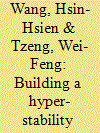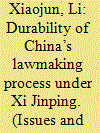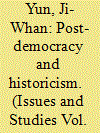|
|
|
Sort Order |
|
|
|
Items / Page
|
|
|
|
|
|
|
| Srl | Item |
| 1 |
ID:
177740


|
|
|
|
|
| Summary/Abstract |
Having been a stable authoritarian regime for more than seven decades, China is an excellent example of how authoritarian regimes can resist pressure from a rapidly transforming society. Its capacity to adapt to social change and maintain a strong hold on power has been observed by students of Chinese politics in the nature of its institutions. These include fragmented governments, decentralization, flexible governance, adaptive capacity, consultative functions, bargained mechanisms, and responsiveness. Xi Jinping’s rise to power and the introduction of information and communications technology (ICT) in recent years have brought about the evolution of the Chinese Communist Party’s methods for governing society. Changes in its governing strategy have merited a review of our understanding of the Chinese regime and inspired an investigation into how social stability is maintained in China. In this paper, we review previous descriptions of China’s authoritarianism and observe the policies the Xi regime has adopted to strengthen state power. We propose that for the purposes of social control, the Xi administration has been building a hierarchical state machine and expanding this machine to the digital sector of society, a campaign which we call “institutional autocratization.” These efforts to establish a hyper-stability structure with new technologies may indeed have strengthened Xi’s rule.
|
|
|
|
|
|
|
|
|
|
|
|
|
|
|
|
| 2 |
ID:
177738


|
|
|
|
|
| Summary/Abstract |
This study focuses on increasing support for radical means among the Hong Kong youth. Previous studies have suggested the incompatibility between two components of a dual identity as a cause of radicalization, yet few have explored the mechanics of this process in detail. This study employs qualitative methods to investigate how the growing incompatibility between the identity of Hong Kong citizens as Hongkongers and as Chinese may contribute to radicalization among tertiary students. This study first conducted quantitative analyses to confirm the positive relationship between identity incompatibility and support for radical means. Past research has argued that nested identities should not be perceived as mutually exclusive. However, qualitative interviews revealed that some respondents did perceive the two identities in zero-sum terms and saw mainland China as a “cultural other.” Our study distinguished these two types of identity incompatibilities as either an “ambiguous incompatibility” or a “manifest incompatibility.” We propose that a “manifest incompatibility” has contributed to radicalization through three pathways: (1) pathways defined by the need for an identity, (2) emotional pathways, and (3) ideological pathways. Support for radical means is likely driven by a variety of factors that include perceived threats to a local identity, the negative emotions that accompany identity incompatibility, and the adoption of a new ideology that involves the rejection of previously accepted moral principles. By illuminating the possible mechanisms that explain how identity incompatibility may lead to a rise in support for the use of radical means, this study not only contributes to the theoretical discussion on radicalization but also sheds light on the widespread participation in recent protests in Hong Kong.
|
|
|
|
|
|
|
|
|
|
|
|
|
|
|
|
| 3 |
ID:
177739


|
|
|
|
|
| Summary/Abstract |
Investment Law (FIL) after a short deliberation period of only three months. This expedited legislative process seems unusual, considering that the original draft of the FIL proposed by the Ministry of Commerce in January 2015 was tabled indefinitely after a brief period of public consultation. How can we explain this stark difference? Comparing the legislative processes and contents of the two laws, this paper shows that, as with many previous laws, bureaucratic politics likely contributed to an impasse in the 2015 draft, whereas external shocks—in this case, the escalating trade war between China and the United States—helped accelerate the deliberation process and the passage of the new FIL. These two cases demonstrate the durability of lawmaking institutions and procedures under Xi Jinping despite the recentralization of power in the executive after changes to the constitution.
|
|
|
|
|
|
|
|
|
|
|
|
|
|
|
|
| 4 |
ID:
177737


|
|
|
|
|
| Summary/Abstract |
Since Japan’s imposition of export controls against Korea in July 2019 and its following countermoves, including the termination of the General Security of Military Information Agreement, the governments of both countries have presented their own narratives of the origin of this trade war, both of which mirror theories of international politics. Nonetheless, these narratives mask several domestic origins. Most importantly, this paper demonstrates that behind the trade war, there has been a preoccupation of the two governments with mutually irreconcilable version forms of historicism. One is Korea’s pro-naturalist historicism, seeing Korean history as being preordained by the universal laws of human progress and defining Japan as a historical reactionary. The other is Japan’s anti-naturalist historicism, upholding internationalism as a new driving force of history that will transform Japan from a war criminal state into a proper subject in international society while criticizing Korea as being a drag on this transformation. This paper argues that, resulting from decades-long neoliberal politics that have disturbed the state-society balance, the national structure of post-democracy has encouraged each government to push historicism to its limit as an alternative source of political legitimacy in lieu of democratic accountability. Concretely, it shows that post-democracy has determined (1) the historicist framing of emerging conflicts, (2) the government’s legislative struggles to realize historicist policies, and (3) the incontestability of historicist hostility by other ideas in each country.
|
|
|
|
|
|
|
|
|
|
|
|
|
|
|
|
|
|
|
|
|